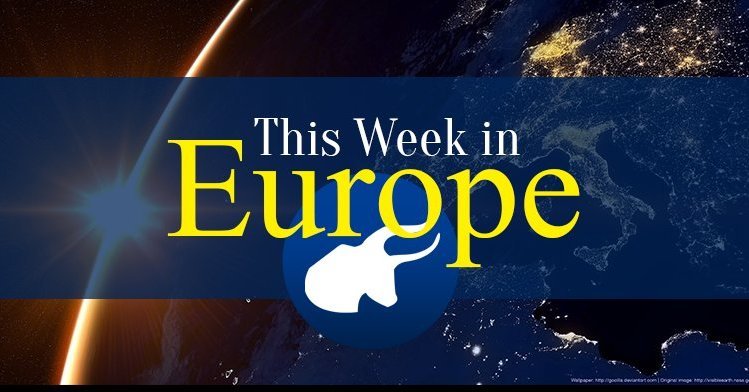As many as one million march against Brexit
This Saturday British citizens came from all over the UK to march through London in opposition to Brexit and to demand a new referendum. At least hundreds of thousands attended the demonstration and organisers estimate that a million or more may have turned out. The protesters filled London’s streets from the square outside the UK Parliament all the way back to Hyde Park, some three kilometres away, with EU flags flown at every stage of the march. In spite of the large numbers, the protest was an entirely peaceful event with no incidents and minimal policing. The size of the protest made it one of the biggest in UK history and was largely absent of any party political affiliation. This was in addition to a petition this week on the UK Parliament’s official website, calling for Article 50 to be revoked and the UK to remain in the EU, reaching 4.7 million signatures (as of Saturday evening).
The EPP suspends Fidesz
The growing rift within the EPP over the place of Viktor Orbán’s Fidesz reached its conclusion this week as the party decided to suspend its Hungarian member. The decision was largely seen as a weak compromise that gave Fidesz an easy way to claim victory. Parties from the liberal wing of the EPP had been calling for Fidesz to be expelled over its increasingly authoritarian and hard-right positions, going so far as to target current Commission President, Jean-Claude Juncker, himself a member of the EPP. Yet the final resolution described both Fidesz and the EPP mutually agreeing to the suspension, with no final decision to be taken for months. Importantly this suspension at the party level won’t affect the actual EPP group within the European Parliament, meaning that Fidesz MEPs will still be able to sit with the other EPP parties. President Macron, a fierce opponent of Orbán, said that the decision showed the EPP had given priority to ‘the clan logic to the detriment of the power of ideas’.
UK and EU agree to extend Article 50
Following the UK Parliament’s vote in favour of an extension of the Article 50 negotiating period, the EU this week set out the terms of this extension. This pushed back the official Brexit date two weeks from 29th March to 12th April. During this two week period, the UK would have to either pass the current deal or come back with a proposal for some substantially different new way forward, which could win the approval of the EU for another, longer extension. Such an extension would also require the UK to decide to participate in the European Parliament elections. In a letter from Tim Barrow, the UK’s Ambassador to the EU, the UK formally accepted the terms of this extension.
Liberal Čaputová comes in first in Slovakia’s presidential elections
Zuzana Čaputová, the candidate of the liberal Progressive Slovakia party, gathered more than 40% of the votes in the first round of the Slovak presidential elections that took place on the 16th of March. Čaputová will face off against socialist Maroš Šefčovič, who scored nearly 20%, in the second round. If victorious, she will become the first woman president of Slovakia. A lawyer by trade, Čaputová is known for her anti-corruption stances and legal fights, including one against businessman Marian Kočner, who was charged earlier this month for ordering the murder of investigative journalist Jan Kuciak. Čaputová has backed more EU integration in foreign and economic issues but has fought back against the measure of refugee relocation. Also opposing the measure, Šefčovič harked back to his conservative and Catholic orientation, distanced himself from the European Commission and attacked Čaputová for her support of same-sex couples.
Germany & Belgium propose annual rule of law review
On Tuesday, a joint proposal by Germany and Belgium called for the creation of an annual monitoring mechanism for the rule of law. The new mechanism would be applied in parallel to the already existing Article 7 procedure and would examine, annually, the state of the rule of law in all EU members. Belgian MoFA Didier Reynders, whose country argued for such a mechanism for 3 years, stated that the proposal was supported by a “wide majority, more than 20 states”. According to the proposal, national, European and international sources would review judicial independence, effective judicial protection and legal certainty.” The same draft proposal, however, has no binding legal consequences and participation will be voluntary.
Commission fines Google €1.49 billion for abusing dominant position
On Wednesday, the European Commission fined Google with €1.49 billion for restricting rival online advertising services to access third-party websites. After fining the search engine for practices relating to online shopping and the Android platform, the Commission now targeted Google’s AdSense service. AdSense gave third-party websites revenue by including ads which were triggered by Google’s search tool. Simply put, other advertising services were banned by Google from including a Google search box on their webpages until the same sites gave Google ads an advantageous position. So far, Brussels has fined Google €8.25 billion for abusing its dominant position to exclude rivals over the past years.
Far-right populists win Dutch provincial elections
On Thursday, it was revealed that far-right populist newcomer Forum for Democracy gathered the most votes in this week’s Dutch provincial elections. In the Dutch system, regional parliaments determine the makeup of the Senate. Together with the Greens, the Euroskeptics marked the most electoral gains, putting pressure on Dutch liberal PM Mark Rutte, who is in danger of losing the majority in the parliament. Forum for Democracy, led by Thierry Baudet, won the most votes, gaining 13 seats in the Senate - one more than Rutte’s liberal VVD - after entering politics just 3 years ago. In celebrating his win, Baudet said that the arrogance of the elite, meaning “our universities, our journalists … and administrators”, has been punished. On the other hand, Geert Wilder’s Freedom Party and the Socialists lost seats. At the moment, Rutte’s coalition holds a fragile one-seat majority in the Senate. The provincial elections were overshadowed by a shooting in Utrecht in the aftermath of which 3 people were killed and a Turkish-born man was arrested.


Follow the comments: |
|
